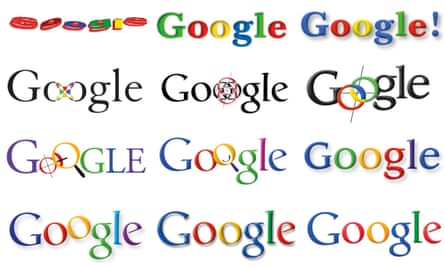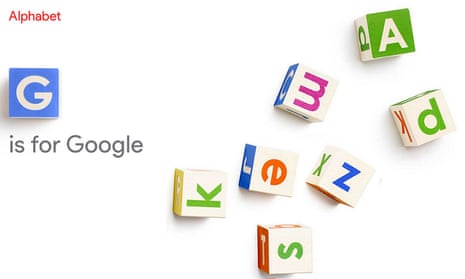“Sergey and I are seriously in the business of starting new things,” writes Google co-founder Larry Page, in his blogpost launching the company’s latest venture to the world: the birth of a Google mother-brand, henceforth to be known as Alphabet. It is something of an understatement for an organisation set on conquering every aspect of our known existence, having grown from the small ambition of indexing all the world’s information, into a web of endless autonomous divisions that now tackle everything from self-driving cars to roaming internet balloons to slowing down the process of ageing.
So what brand could represent this new catch-all umbrella, an overarching vehicle for the company’s voracious new forays into further-flung fields? The evolution of the Google brand over the years has always reflected the company’s changing aspirations, from the homespun novelty WordArt of a pair of Stanford maths geeks, to the slick logo we see today.
The rainbow Google! lost its exclamation mark in 1999, the jaunty drop-shadow was scrapped in 2010, and the chubby 3D letters were finally slimmed and flattened on the page in 2013, complete with a matching family of Google Apps logos, all rendered in the same unthreatening pre-school palette.
But Alphabet represents another direction entirely. While the word Google was born of the fun, nonsensical word trend of early dotcom years (as a play on Googol, the mathematical term for the number 1 followed by 100 zeros), Alphabet speaks more of the realm of a grown-up corporate, with the anonymous, universal ring of a management consultancy or venture capitalist firm. Indeed, Page says:
We are also stoked about growing our investment arms, Ventures and Capital, as part of this new structure ... we also like that it means alpha‑bet (Alpha is investment return above benchmark), which we strive for!
Alphabet, drawn in a restrained red sans-serif typeface, marshalled to the bottom corner of each page, is more about rock-solid return on investment than quirky startup risk-taking. Because there’s no longer really any risk when you own the whole world.
Page says they also chose the name because language is “one of humanity’s most important innovations”, and the core of how they index with Google search; but it also points to an ambition to claim ownership over the fundamental building blocks of everyday life. They might as well have called it DNA Inc.
The domain name is abc.xyz (because alphabet.com was already taken by a fleet management division of BMW Group – which points towards potential future trademark issues with Google’s car ambitions), a URL that also points towards Alphabet’s all-encompassing reach and its plan for absolute domination of everything in between.
It’s logotype may be more grown up, but Alphabet hasn’t shaken off the cutesy pre-school vibe altogether. The holding page for the company features a scatter of children’s alphabet building blocks, as if to reassure us that, aw-shucks, it’s still the same old cuddly Google beneath the rebrand. “Don’t worry,” adds Page at the end of his chummy missive, “we’re still getting used to the name too!”

Little else about the brand has been revealed, but the likelihood is that those authoritative red letters probably won’t be very visible. Alphabet will act instead as an incubator for myriad pursuits and offshoots, each with their own identities, including the smart-home division, Nest, and the sci-fi speculations of X Labs, as well as paving the way for further acquisitions. As Page puts it:
We are not intending for this to be a big consumer brand with related products – the whole point is that Alphabet companies should have independence and develop their own brands.
A bit like the phenomenon of stealth Starbucks branches, it represents the point at which Google has become so ubiquitous, it must fade into the background or else risk shouting out its own success. The more it tries to fade into background anonymity, the more important it will be to drag it into the spotlight, before the entire world gets subsumed into the great Alphabet soup.

Comments (…)
Sign in or create your Guardian account to join the discussion